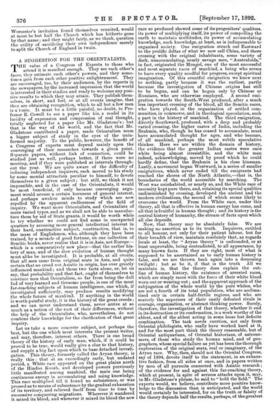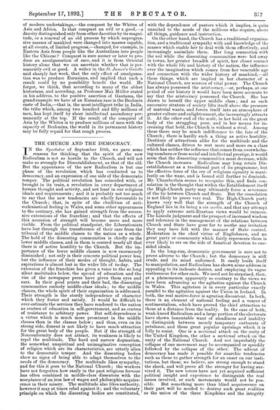A SUGGESTION FOR THE ORIENTALISTS. T HE value of a Congress
of Experts to those who attend it is manifest enough. They see each other's faces, they estimate each other's powers, and they some- times gain from each other positive enlightenment. They are encouraged, too, by their audiences, by the reports in the newspapers, by the increased impression that the world is interested in their studies and ready to welcome any posi- tive results to which they may attain. They publish them- selves, in short, and feel, or at all events imagine, that they are obtaining recognition, which to all but a few men is a tonic. It must be a little painful, no doubt, to Pro- fessor E. Cowell to see a paper like his, a model in its lucidity of expression and. compression of real thought, totally neglected for a paper like Mr. Gla,dstone's ; but that is the way of the world, and the fact that Mr. Gladstone contributed a paper, made Orientalism seem a bigger subject of study in the eyes of the unin- formed majority. To the public, however, the benefit of a Congress of experts must depend mainly upon the converging of their researches towards a given point. Separate papers, without link of connection, could be studied just as well, perhaps better, if there were no meeting, and if they were published at intervals through- out the year. We are quite aware of the difficulty of inducing independent inquirers, each moved to his study by some mental attraction peculiar to himself, to devote themselves to a given subject ; but still, we think it not impossible, and in the case of the Orientalists, it would be most beneficial, if only because converging argu- ment would arouse a certain keenness of general interest, and perhaps awaken minds to study which are now repelled by the apparent endlessness of the field of inquiry. We want more Orientalists, and Orientalists of more varied types, and as we shall not be able to manufac- ture them by aid of State grants, it would be worth while to try whether we could not find some in unexpected quarters by arousing more general intellectual interest in their hard, unattractive subject, unattractive, that is, to the mass of Englishmen, who, although they have been trained, by a miracle of good fortune, on one collection of Semitic books, never realise that it is in Asia, not Europe— which is a comparatively new place—that the earlier his- tory of man, and of the slow evolution of human thought must alike be investigated. It is probable, at all events, that all men came from original seats in Asia, and quite certain that no creed not Asiatic in origin, has ever greatly influenced mankind ; and those two facts alone, or, let us say, that probability and that fact, ought of themselves to convince men that Orientalism, so far from being the dull fad of very learned and tiresome people, is one of the most far-reaching subjects of human intelligence, one which, if investigated sufficiently, may produce results modifying the whole future of mankind. If anything in the world is worth painful study, it is the history of the great creeds ; and we can never understand them, never arrive at so much as a notion of the root of their differences, without the help of the Orientalists, who, nevertheless, do not combine their knowledge for the clarification of that great inquiry.
Let us take a more concrete subject, not perhaps the best, but the one which most interests the present writer, and may, therefore, interest others. There is one broad theory of the history of early man, which, if it could be proved to be true, would really give a clue to that history, and supply a big fact upon which to base detached investi- gation. This theory, formerly called the Aryan theory, is really this : that at an exceedingly early, but undated period, a White race appeared on the great plains north of the Hindoo Koosh, and developed powers previously little manifested among mankind, the main one being continuous energy in accumulating and using knowledge. This race multiplied till it found no subsistence, or was pressed as to means of subsistence by the gradual exhaustion of its territory, and relieved itself from time to time by successive conquering migrations. Wherever it wandered it mixed its blood, and wherever it mixed its blood the new race so produced showed some of its progenitors' qualities, its power of multiplying itself, its power of compelling the earth to maintain multitudes, its power of accumulating knowledge, such knowledge, at least, as is indispensable to organised society. One emigration struck out Eastward to the prolific deltas of what we now call China, and there crossing with the original inhabitants, some variety of dark, unaccumulating, nearly savage men, " Australoids," in fact, originated the Mongol, one of the most successful and most separate races of mankind, a being who seems to have every quality needful for progress, except spiritual imagination. Of this eventful emigration we know next to nothing, partly because it was the earliest, partly because the investigation of Chinese origins has still to be begun, and can be begun only by Chinese or Russians, who are otherwise employed. A second emi- gration towards the South-West produced, after a much less important crossing of the blood, all the Semitic races, who have played, in the organisation of settled com- munities, in commerce, and in theological speculation, such a part in the history of mankind. The third emigration, directly Southward, produced, with a deep and probably varied crossing, the higher castes of India, including the Brahmin, who, though he has ceased to accumulate, must have accumulated thought for ages, and who became, of all mankind, perhaps the most subtle speculative thinker. Here we are within the domain of history, the evidence that the greater Indian castes were once white being almost irresistible, and the white man indeed, acknowledging, moved by proof which he could hardly define, that the Brahmin is his close kinsman.
Lastly, a movement began Westward, in a series of smaller emigrations, which never ended till the emigrants had reached the shores of the North Atlantic,—that is, the boundaries of the world accessible by marching. The West was uninhabited, or nearly so, and the White race of necessity kept pure there, and, retaining its special qualities undiminished by crossing, developed the ancient and the modern civilisations, the second of which seems likely to overcome the world. From the White race, under this theory, all that is effective in human energy has come, and all that is fruitful in human thought; and its history is the central history of humanity, the stream of facts upon which all else depends.
Now, that theory may be absolutely false. We are making no assertion as to its truth. Inquirers, entitled to all honour, not only for their patient labour, but for their breadth of view, maintain resolutely that, as regards locale at least, the "Aryan theory" is unfounded, or at least unprovable, being contradicted, to all appearance, by many known facts. If they are right, most of what is supposed to be ascertained as to early human history is false, and we are thrown back again into a deepening twilight ; but so be it, if that is the truth All we maintain is, that the theory does explain the out- line of human history, the existence of arrested races, which are simply races with the force of their white blood worn out or wearing out ; and the apparent approach of the subjugation of the whole world by the pure whites, who are not a fourth of its total population, who are acclima- tised only in certain half-fertile regions, and who are scarcely the superiors of their easily defeated rivals in courage, organisation, or abstract thinking power. Surely, therefore, the investigation of that theory, whether it end in its destruction or its confirmation, is a work worthy of the ablest, and of the ablest acting in some loose but definite combination. The task needs exertion, not only from Oriental philologists, who really have worked hard at it, and for the most part think the theory reasonable, but of Oriental antiquarians, of Oriental historians, of astrono- mers, of those who study the human mind, and of geo- graphers, whose special failure as yet has been the thorough exploration of the original seats, real or imaginary, of the Aryan race. Why, then, should not the Oriental Congress, say of 1894, devote itself to the statement, in an exhaus- tive fashion, from all sides at once, and in papers written by men of all pursuits connected with Asiatic research ; of the evidence for and against this far-reaching theory, which at present, in spite of serious attacks upon it, may, in Mr. Gladstone's phrase, be said to" hold the field." The experts would, we believe, contribute more positive know- ledge to the discussion than is anticipated, and the world would certainly be interested, for on the truth or falsity of the theory depends half the results, perhaps, of the greatest of modern undertakings,—the conquest by the Whites of Asia and Africa. Is that conquest an evil or a good,—a .dacoity distinguished only from other dacoities by its magni- tude, or a renewal of an old process by which unprogres- sive masses of mankind were changed into masses capable, at all events, of limited progress,—changed, for example, in Eastern Asia from people like the Australians into people like the Chinese ? Conquest is sure sooner or later to pro- duce an amalgamation of race, and it is from Oriental history alone that we can ascertain whether that is per- manently evil or good. A writer in the St. James's Gazette said sharply last week, that the only effect of amalgama- tion was to produce Eurasians, and implied that such a result could by no possibility benefit the world. He forgot, we think, that according to many of the ablest historians, and according, as Professor Max Muller stated in his address, to the positive assertion of Gautama, the grand example we have of an Eurasian race is the Brahmin caste of India,—that is, the most intelligent tribe in India, the tribe which, among two hundred and fifty millions of men, has kept itself by sheer intellectual ascendency per- manently at the top. If the result of the conquest of Asia by the Whites is to produce millions of men with the capacity of Brahmins, the world in its permanent history may be fully repaid for that rough process.



































 Previous page
Previous page